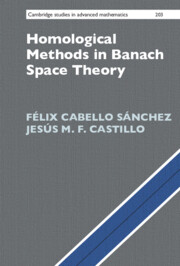Book contents
- Frontmatter
- Contents
- Preface
- Preliminaries
- 1 Complemented Subspaces of Banach Spaces
- 2 The Language of Homology
- 3 Quasilinear Maps
- 4 The Functor Ext and the Homology Sequences
- 5 Local Methods in the Theory of Twisted Sums
- 6 Fraïssé Limits by the Pound
- 7 Extension of Operators, Isomorphisms and Isometries
- 8 Extension of C(K)-Valued Operators
- 9 Singular Exact Sequences
- 10 Back to Banach Space Theory
- Bibliography
- Index
2 - The Language of Homology
Published online by Cambridge University Press: 19 January 2023
- Frontmatter
- Contents
- Preface
- Preliminaries
- 1 Complemented Subspaces of Banach Spaces
- 2 The Language of Homology
- 3 Quasilinear Maps
- 4 The Functor Ext and the Homology Sequences
- 5 Local Methods in the Theory of Twisted Sums
- 6 Fraïssé Limits by the Pound
- 7 Extension of Operators, Isomorphisms and Isometries
- 8 Extension of C(K)-Valued Operators
- 9 Singular Exact Sequences
- 10 Back to Banach Space Theory
- Bibliography
- Index
Summary
The chapter introduces the basic elements of the homological language and translates the statements about complemented and uncomplemented subspaces presented in Chapter 1 into this language. The reader will find everything they need to know at this stage about exact sequences, categorical and homological constructions for absolute beginners and injective and projective Banach and quasi-Banach spaces. The chapter describes the basic homological constructions appearing in nature: complex interpolation, the Nakamura-Kakutani, Foia\c{s}-Singer, Pe\l czy\’nski-Lusky and Bourgain’s $\ell_1$ sequences, the Ciesielski-Pol, Bell-Marciszewski and Bourgain-Pisier constructions, the Johnson-Lindenstrauss spaces and so on. A good number of advanced topics are included: diagonal and parallel principles for exact sequences, the Device, 3-space results, extension and lifting of operators, $M$-ideals and vector-valued Sobczyk’s theorems
Keywords
Information
- Type
- Chapter
- Information
- Homological Methods in Banach Space Theory , pp. 46 - 127Publisher: Cambridge University PressPrint publication year: 2023
